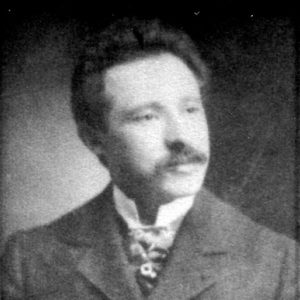calsfoundation@cals.org
Benjamin J. (B. J.) Rosewater (1857–1943)
Modern Eureka Springs (Carroll County), including the historic Carnegie Library and Basin Spring Park, owes much of its development to early resident of the city Benjamin J. Rosewater. An energetic advocate of civic improvement and a business leader serving for several years as postmaster, the Jewish immigrant from Eastern Europe left a lasting mark on the Ozarks mountain town where he lived for more than sixty years.
Born in Hungary in 1857, B. J. Rosewater first came to the United States to visit family in Chicago, Illinois. After moving briefly to Cairo, Illinois, Rosewater visited Eureka Springs in August 1882 in an effort to improve his health. Rosewater quickly recovered from his illness, and he liked the chaotic frontier town and burgeoning tourist destination so much that he decided to move there permanently. Rosewater purchased the Eureka Springs Concentrating Company, a soap manufacturing firm, the same year he arrived. Rosewater’s other business ventures included owning a stone quarry in nearby Beaver (Carroll County) that, beginning in 1883, supplied much of the limestone used for the major building construction in Eureka Springs.
Eureka Springs was experiencing a turbulent three-year period of land disputes and uncertainty over title claims when Rosewater moved there. Many residents resisted establishment of basic infrastructures and city planning, and some of the wealthiest vacationers and health-seeking tourists opted to live in tents instead of buildings. Rosewater joined former governor Powell Clayton and other members of the town in leading a civic improvement movement. Eureka Springs rapidly improved, despite some fires and other setbacks.
Rosewater and Clayton maintained regular correspondence for years, including while Clayton was U.S. ambassador to Mexico. Archives of their letters—which discussed business affairs, the Republican Party, and Eureka Springs and Arkansas state politics—are preserved at Yale University’s Beinecke Library in New Haven, Connecticut, and at the Arkansas State Archives in Little Rock.
Rosewater quickly came to prominence among advocates of reform in Eureka Springs by leading efforts to fence in and beautify the Basin Springs. He also served as the second director of the Interstate Summer Normal and Educational Assembly. Rosewater later recalled seeing the trainloads of visitors who came to town each week by the 1890s, almost more than the city could accommodate, and how more than 3,000 people often crowded into performances at the auditorium near the Dairy Springs, which he had also helped found.
The city council commissioned Rosewater, along with Z. P. Freeman, to complete a resurvey of the town, a project that came to be known as the Riley survey, to help guide future city development. Rosewater led the organization and was a founding member of the Commercial Club, which later became the city’s Chamber of Commerce. He served eight years as secretary and four years as president.
On July 24, 1900, Rosewater married Gertrude M. Britts, the daughter of a Union war veteran who had settled in Eureka Springs. Their two children, Jerome and Clara, stayed in Eureka Springs and were involved in civic affairs themselves into the 1980s.
Rosewater led the city’s successful campaign to receive funding from the Andrew Carnegie Fund to establish a public library, and, in recognition of this, the Eureka Springs Library named him president of its board of trustees for life. He was charged with overseeing the construction of the building, which began in 1910. The building still houses the library.
Rosewater received his first federal appointment, to the position of postmaster, on March 4, 1898. Rosewater served until 1910, despite multiple challenges to his office. Opponents used his Jewish heritage against him in his campaigns for postmaster, and newspaper articles from the period included anti-Semitic slurs. A rare Republican in Arkansas at the time, Rosewater served as postmaster during successive Republican presidential administrations. Under Rosewater’s administration, delivery service extended to the entire city and into some rural areas.
When he first began his tenure, the postmaster’s office was in a rented one-room office, the first post office building having burned in the fire of 1890. Through a partnership with Dr. C. A. Ellis, Rosewater secured funding for the construction of expanded post office facilities in what came to be called the Ellis-Rosewater building; the post office remained there until 1918.
Rosewater suffered a debilitating heart attack at the age of eighty-two while visiting the home of his daughter. He died a few years later on October 11, 1943. He is buried in the Independent Order of Odd Fellows Cemetery in Eureka Springs.
For additional information:
Call, Cora Pinkley. Pioneer Tales of Eureka Springs and Carroll County. N.p.: 1930.
“Eureka Springs.” Ozark Folk Encyclopedia. Otto Ernest Rayburn Papers. Special Collections. University of Arkansas Libraries, Fayetteville, Arkansas.
LeMaster, Carolyn Gray. A Corner of the Tapestry: A History of the Jewish Experience in Arkansas, 1820s–1990s. Fayetteville: University of Arkansas Press, 1994.
Powell Clayton Letters to B. J. Rosewater, 1898–1901. Yale Collection of Western Americana. Beinecke Library. Yale University, New Haven, Connecticut.
Joshua Cobbs Youngblood
University of Arkansas, Fayetteville
 Post-Reconstruction through the Gilded Age, 1875 through 1900
Post-Reconstruction through the Gilded Age, 1875 through 1900 ACF Logo
ACF Logo  B. J. Rosewater
B. J. Rosewater 




Comments
No comments on this entry yet.